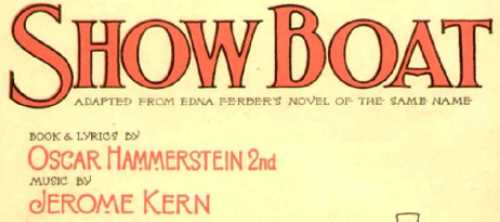
Show Boat est considéré comme le tournant majeur à Broadway qui a vu le théâtre musical devenir adulte et ouvert la voie à George Gershwin, Cole Porter, Richard Rodgers, Stephen Sondheim, etc. Tous les compositeurs de Broadway ont avoué que Jerome Kern était à la fois leur père spirituel en tant que musicien, et le père fondateur du théâtre musical tel que nous le connaissons encore aujourd'hui.
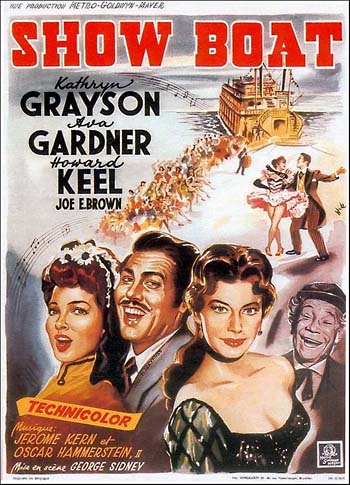
Version 13
Show Boat (1951-07-Film)
Type de série: FilmThéâtre: *** Film (*** - ***)
Durée :
Nombre :
Première Preview : Inconnu
Première : mardi 17 juillet 1951
Dernière : Inconnu
Mise en scène : George Sidney •
Chorégraphie :
Producteur :
Avec : Magnolia Hawks ... Kathryn Grayson / Gaylord Ravenal ... Howard Keel / Julie LaVerne ... Ava Gardner / Cap'n Andy Hawks ... Joe E. Brown / Ellie May Shipley ... Marge Champion / Frank Schultz ... Gower Champion / Steven Baker ... Robert Sterling / Parthy Hawks ... Agnes Moorehead / Pete ... Leif Erickson / Joe ... William Warfield / Julie LaVerne (singing) ... Annette Warren
Commentaires longs: The 1951 film version of Show Boat was adapted from the original 1927 stage musical by John Lee Mahin after Jack McGowan and George Wells had turned in two discarded screenplays, and was directed by George Sidney. Filmed in the typical MGM lavish style, this version is the most financially successful of the film adaptations of the play: one of MGM's most popular musicals, it was the third most profitable film of 1951.
Although arguably one of the studio's less inventive film musicals, the film is more overtly cinematic than the 1936 version — the boat is seen winding its way down the river several times, and there are two scenes in which the boat is shown leaving the dock, while the 1936 film version is so faithful in following the stage play that the boat is seen moving only at the very beginning of the film, when it arrives at a river town.
The staging of several of the songs is more elaborate than in the 1936 version.
In the 1936 film, Magnolia and Ravenal sing the song "Make Believe" just as they do in the stage version of the musical, with Ravenal standing on a river piling and Magnolia standing on the upper deck of the boat, in the manner of the Romeo and Juliet balcony scene. He does not even enter the boat until during the later "miscegenation" scene, just as he does in the stage version. In the 1951 film, Ravenal climbs on board the boat as soon as he first walks up to it, and then meets Magnolia for the first time. He follows her to the upper deck to sing the song, and the two walk around the deck while singing the last few lines.
When Julie and several other characters sing "Can't Help Lovin' Dat Man" in the 1936 film, they sing it inside the boat, in the kitchen, (just as in the stage version) with only the last moments of the song being sung on the deck. In the 1951 film, the song is sung entirely on the ship's upper deck, taking full advantage of the surrounding scenery. The boat's kitchen is never shown in the 1951 film.
In the 1936 film, just as in the stage version, Joe and the other dock workers sing "Ol' Man River" while sitting on crates and cotton bales on the levee, and the song is made cinematic through the use of an elaborate expressionistic montage of levee workers performing their tasks. In the 1951 film, Joe sings one refrain of the song while standing on the levee and then walking to the dock, and the last part of the song is sung by Joe standing on the boat's lower deck as it winds its way down the river, accompanied by an offscreen chorus.
In the 1936 film, when Julie sings "Bill", she stands next to a piano and never changes her position. (She sat on top of the piano in the stage version.) In the 1951 film, Julie walks around the piano while singing it and leans against the steps of the Trocadero nightclub to sing part of the song.
However, in the 1936 film, the staging of the show boat parade in the opening scenes was more elaborate than in the 1951 version. In the 1951 version, the parade members (as well as the actors) stay on the dock, while in the 1936 version, the parade is shown marching down the main street of the town, a huge set constructed by the Universal Pictures craftsmen. The introduction of the show boat company to the crowd is also held there.
The 1951 film was the first film version of Show Boat not to feature Robert Russell Bennett's stage orchestrations in one form or another (the orchestrations in this film were done by Conrad Salinger, Alexander Courage, and the uncredited Robert Franklyn).
Le bâteau-théâtre « Show Boat » accoste dans un port de Louisiane, sur le Mississipi, afin de présenter son spectacle dont l’attraction majeure est la chanteuse Julie La Verne, objet de toutes les convoitises. Son amant, furieux d’être éconduit, la dénonce alors comme mulâtresse aux autorités locales. Elle ne peut donc se produire sur scène, sous peine de choquer la bourgeoisie blanche sudiste, et est expulsée de la compagnie avec son mari et partenaire, au grand désespoir de la fille des propriétaires du bateau, Magnolia, dont elle est la meilleure amie. Ce contretemps propulse Magnolia sur scène pour la remplacer au pied levé, avec pour partenaire un célèbre joueur professionnel, Gaylord Ravenal, qui s’est fait embaucher en remplacement du mari expulsé. Le coup de foudre entre Magnolia et Gaylord est le point de départ d’une saga sentimentale, mélancolique et mouvementée qui va voir l’ascension et la gloire de Magnolia en tant que grande vedette de la scène, les déboires de Gaylord en tant que joueur irresponsable et ruiné, et la tragique déchéance de Julie La Verne, qui s’effacera toujours, à son insu, au profit de Magnolia, sans jamais la revoir…
1 Show Boat peut-être considéré comme un Top musical
2 Show Boat peut-être considéré comme un musical fondateur, c'est-à-dire ayant marqué l'histoire des musicals. Première vraie comédie musicale
Entre 1890 et 1925, la plupart des spectacles musicaux de Broadway étaient soit des revues luxueuses et burlesques, soit des opérettes de style européen, soit des histoires mièvres de campus universitaires où les étudiants s’agitent sur des charlestons endiablés. Le compositeur Jerome Kern, célèbre mélodiste, souhaitait rénover le théâtre musical américain, et cherchait un sujet « sérieux ». Lisant le roman à succès d’Edna Ferber, il eut l’idée, avec Oscar Hammerstein II, d’en faire une opérette moderne où la musique et les lyrics seraient véritablement imbriqués à l’intrigue, procédé facilité par le contexte social où négro-spirituals et jazz naissant étaient des éléments fondamentaux de l’univers culturel des esclaves. Le projet, aussitôt connu, fut donné perdant à cause de son audace, et la proposition de Florenz Ziegfeld de produire ce spectacle inhabituel fut la grande surprise de l’année. Le triomphe remporté par l’oeuvre fut à la mesure du courage qu’il avait fallu pour oser monter à Broadway un spectacle plutôt sombre et mélancolique, mais à forte charge émotionnelle. Le récit parallèle de deux destins contraires, l’un ascendant (Magnolia), l’autre descendant (Julie), l’évocation du racisme latent chez plusieurs protagonistes comme un sentiment inhumain, des mélodies mélancoliques prenant racine dans la douleur des esclaves noirs, la nostalgie des moments perdus, le temps qui passe et provoque l’irrémédiable, la sournoiserie des uns, la bonté des autres, l’amitié éternelle entre les deux femmes, autant d’ingrédients qui encore aujourd’hui nous touchent profondément et expliquent le succès grandissant de l’oeuvre à chacune de ses reprises.
The musical numbers in the original production were as follows:
Acte 1
"Cotton Blossom" – Stevedores and Townspeople
"Cap'n Andy's Ballyhoo" - Cap'n Andy and Chorus
"Where's the Mate for Me?" – Gaylord Ravenal
"Make Believe" – Gaylord and Magnolia
"Ol' Man River" – Joe and Stevedores
"Can't Help Lovin' Dat Man" – Julie, Queenie, Joe, Magnolia and Ensemble
"Life Upon the Wicked Stage" – Ellie and Townswomen
"Till Good Luck Comes My Way" – Gaylord, Pete, Frank and Townsmen
"Ol' Man River" (reprise) - Joe
"I Might Fall Back on You" – Ellie, Frank and Girls
"C'mon Folks (Queenie's Ballyhoo") – Queenie, Stevedores and Gals
"Olio Dance" - (instrumental)
"You Are Love" – Gaylord and Magnolia
Act I "Finale (Wedding Scene)" - Magnolia, Ravenal, Cap'n Andy, and Chorus
Act 2
"At the Fair" – Sightseers, Barkers, and Dandies
"Dandies on Parade" – City Folk
"Why Do I Love You?" – Magnolia, Ravenal, Cap'n Andy, Parthy Ann Hawks and Company
"In Dahomey" – Jubilee Singers and Dahomey Dancers
"Bill" (lyrics by P. G. Wodehouse and revised by Hammerstein) – Julie
"Can't Help Lovin' Dat Man" (reprise) – Magnolia
"Nuns' Processional" - Nuns
"Make Believe" (reprise) - Ravenal
"Goodbye, My Lady Love" (music and lyrics by Joseph E. Howard) – Frank and Ellie
"After the Ball" (from A Trip to Chinatown; music and lyrics by Charles K. Harris) – Magnolia and Ensemble
"Ol' Man River" (reprise) – Joe
"Hey, Feller" – Jubilee Singers and Queenie
"You Are Love" (reprise) – Gaylord
"Why Do I Love You?" (reprise) – Kim and Flappers
"Finale Ultimo (Ol' Man River)" - Joe and Chorus
History of revisions
The original production ran four-and-a-half hours during tryouts, but was trimmed to just over three by the time it got to Broadway. During previews, two songs, "Mis'ry's Comin' Round" and "Let's Start the New Year", were cut from the show. "Mis'ry's Comin' Round" was nevertheless published in the complete vocal score,[4] and fragments of it are still heard in the scoring, notably in the original 1927 overture and in the miscegenation scene. The 1988 album reinstated the entire song, and it was also included in the 1994 Hal Prince revival. "Let's Start the New Year" was performed in the 1989 Paper Mill Playhouse production.[7] These songs (and others) are generally cut when the show is staged, although productions sometimes still run to three hours or more.
Two songs, "Till Good Luck Comes My Way" (sung by Ravenal) and "Hey Feller!" (sung by Queenie), were written mainly to cover scenery changes and were discarded beginning with the 1946 revival, although "Till Good Luck" was included in the 1993 Harold Prince revival of the show. The comedy song "I Might Fall Back On You" was also cut beginning in 1946, although it was restored in the 1951 film version and several stage productions since the 1980s. On record, "Hey Feller!" appears only on the 1988 EMI album. Kern and Hammerstein wrote two new songs for revivals and three more for the 1936 film version.
The Harold Fielding production in London in the early 1970s did not use the entire score - "Hey, Feller!" and "In Dahomey" were omitted, among others. This cast album broke ground in being the first 2-LP version of Show Boat ever released.
The score also includes four songs not originally written for Show Boat: "Bill" was originally written by Kern and P. G. Wodehouse in 1917 and was reworked by Hammerstein for Show Boat. Two other songs not by Kern and Hammerstein, "Goodbye, My Lady Love" by Joseph E. Howard and "After the Ball" by Charles K. Harris, were included by the authors for historical atmosphere and are included in revivals.[8] The New Year's Eve scene also features an instrumental version of "There'll Be a Hot Time in the Old Town Tonight".
Some of the following numbers have been cut from subsequent productions, as noted below: (The songs "Ol' Man River", "Can't Help Lovin' Dat Man", and "Bill" have been included in every stage and film production of Show Boat)
► Overture – The original overture, used in all stage productions up to 1946 (and heard on the three-disc EMI/Angel CD for the first time in nearly 50 years), is largely based on the deleted song "Mis'ry's Comin' Round", as Kern wanted to save this song in some form. The song was restored in the Harold Prince revival of the show. The overture also contains fragments of "Ol' Man River", "Can't Help Lovin' Dat Man", and a faster arrangement of "Why Do I Love You?" The overtures for the 1946 revival and the 1966 Lincoln Center revival consist of medleys of songs from the show. All three overtures were arranged by the show's orchestrator, Robert Russell Bennett, who orchestrated most of Kern's later shows.
► "Cotton Blossom" – This number is performed in all the stage productions, and shorter versions were used in the 1936 and 1951 film versions.[9] Not heard in the 1929 film version.
► "Where's the Mate for Me?" - Ravenal's first song; heard in all stage versions, partially sung in the 1936 film version, and sung complete in the 1951 film version. Not sung in the 1929 film version.
► "Make Believe" – Performed in all stage versions, and in the 1936 and 1951 film versions, but not the 1929 one.
► "Life Upon the Wicked Stage" – This comic song is usually included in stage versions, but is heard only instrumentally in the 1936 film. Not included in the 1929 film, but sung and danced in the 1951 film version.
► "Till Good Luck Comes My Way" – Kern and Hammerstein cut it from the 1946 revival, but it was reinstated in the 1971 London stage revival. It is heard only instrumentally in the 1936 film and is omitted altogether in the 1929 and 1951 films.
► "I Might Fall Back on You" – This was usually cut after 1946, but it has been reinstated in revivals beginning in 1966. It was absent from the 1929 and 1936 films, but included in the 1951 film.
► "C'mon Folks (Queenie's Ballyhoo)" - Always included in the show, it was sung in the prologue to the 1929 film version,[10] but omitted from the 1936 film and heard only instrumentally in the 1951 film.
► "Olio Dance" – This is rarely performed now, since it was composed simply to cover a change of scenery. It is an orchestral piece that partially uses the melody of "I Might Fall Back on You", and can be heard on the EMI 3-CD album (as Villain Dance). The 1936 film substituted the new Kern-Hammerstein number "Gallivantin' Around", performed as an olio by Irene Dunne (as Magnolia) in blackface. It was omitted from the 1989 PBS Paper Mill Playhouse production. Some modern productions move the song "I Might Fall Back on You" to this spot.
► "You Are Love" – Kern considered this popular waltz to be the score's weakest song: he tried unsuccessfully to eliminate it from the 1936 film version. It has never been cut from any stage production. It was shortened, and the introductory section was omitted, in both the 1936 and the 1951 films. It was not performed in the 1929 film.
► "Act I Finale" – This was shortened in the 1936 film and omitted from the 1929 and 1951 films.
► "At the Chicago World's Fair" – Used in all stage productions except for the Harold Prince 1994 revival, and was omitted from all the film versions, however, it was played instrumentally in the 1936 film.
► "Why Do I Love You?" – Used in all stage versions, this number was sung during the exit music to the 1929 film,[10] filmed but cut and heard only as background music for the 1936 film, and was sung in the 1951 film version. In the 1994 Hal Prince revival it was sung by Parthy.
► " In Dahomey" - Now always cut from productions, this is a number that is potentially offensive to modern sensibilities. It is sung at the Chicago World's fair by a group supposedly made up of African natives, who chant in supposedly African dialect at first and then suddenly break into modern English, singing about how happy they are to return to their apartments after the day is over.
► "Goodbye, My Lady Love" – This is only used in American productions. It is included in the 1936 film, but not in the 1951 film or the 1929 one.
► "After the Ball" - Performed in all stage productions and in both the 1936 and 1951 films, but not the 1929 one.
► "Hey, Feller" - Used in nearly all stage productions up until 1946, and sung in the prologue to the 1929 film.[10] Not used in the 1936 film, but used as background score in the 1951 film before the singing of "Cotton Blossom".
Additional numbers have been included in films and revivals as follows:
► "Mis'ry's Comin' Round" – Though this was cut from the original production, Kern ensured that it was published in the complete vocal score.[4] The 1988 album reinstated it, and it was also included in the 1994 Hal Prince revival.
► "Let's Start the New Year" - Cut from the original production but performed in the 1989 Paper Mill Playhouse production.
► "I Have The Room Above Her" is a romantic duet written by Kern and Hammerstein for Ravenal and Magnolia in the 1936 film. It was included in the 1994 Broadway revival.
► "Gallivantin' Around" is a cakewalk-style number written by Kern and Hammerstein for Magnolia for the 1936 film.
► "Ah Still Suits Me" is a comic duet written by Kern and Hammerstein for the 1936 film, and sung by the characters Joe and Queenie (Paul Robeson and Hattie McDaniel). The number was also included in the 1989 Paper Mill Playhouse production.
► "Nobody Else But Me" was written by Kern and Hammerstein for the 1946 Broadway revival, to be sung in the spot where Kim usually sings a reprise of "Why Do I Love You". This was the last song written by Kern; he died shortly before the 1946 production opened.[12] In the 1971 London stage revival, the song was sung by Julie, in a new scene written especially for that production. It is not sung in any film version of the show, but was frequently heard in stage revivals up until about the 1980s.
► "Dandies on Parade" is a dance number arranged for the 1994 Broadway production by David Krane, largely from Kern's music.
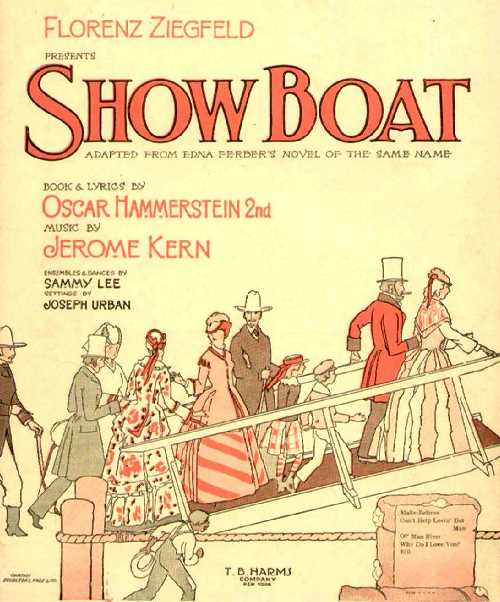
Version 1
Show Boat (1927-12-Ziegfield Theatre-Broadway)
Type de série: OriginalThéâtre: Ziegfield Theatre (Broadway - Etats-Unis)
Durée : 1 an 1 mois 1 semaine
Nombre : 527 représentations
Première Preview : Inconnu
Première : mardi 27 décembre 1927
Dernière : lundi 04 février 1929
Mise en scène : Oscar Hammerstein II • Zeke Colvan •
Chorégraphie : Sammy Lee •
Producteur :
Avec : Windy ... Allan Campbell
Steve ... Charles Ellis
Pete ... Bert Chapman
Queenie ... Aunt Jemima
Parthy Ann Hawks ... Edna May Oliver
Cap'n Andy ... Charles Winninger
Ellie ... Eva Puck
Frank ... Sammy White
Rubber Face ... Francis X. Mahoney
Julie ... Helen Morgan
Commentaires longs: La création à Broadway a été précédée d'un Try Out Tour:
National Theatre [Washington, DC] 15/11/1927 - ?
Nixon Theatre [Philadelphia, PA] 21/11/1927 - ?
Ohio Theatre [Cleveland, OH] 28/11/1927 - ?
Erlanger Theatre [Philadelphia, PA] 5/12/1927 - 19/12/1927
The production was originally supposed to go into the Lyric Theatre but producer Florenz Ziegfeld deemed the stage too small. Rio Rita was originally supposed to be the first show at the new Ziegfeld Theatre. Because of the stage size, Ziegfeld shifted Rio Rita to the Lyric and Show Boat to the Ziegfeld.
Casting might-have-beens:
Florenz Ziegfeld originally wanted tenor Harry Fender as Ravenal. Fender had developed crippling stage fright and could not take the role.
Originally, Ziegfeld, Hammerstein and Kern wanted Paul Robeson to play Joe. But, when the production was delayed by a year, Robeson was unavailable.
Elizabeth Hines was announced as Magnoila (she announced this in her biography in the program for Rio Rita). When she was released from her contract, she sued Ziegfeld (see other note on this page).
Guy Robertson was announced as Ravenal.
Show Boat was originally intended to be produced around April 1927 with Elizabeth Hines, Guy Robertson and Paul Robeson. However, when the writing delayed the start of rehearsals, the performers were released.
Elizabeth Hines (who was announced for the role of Magnolia in early 1927) sued Ziegfeld for approximately $200,000 when he released her from her contract following the spring 1927 delay. She claimed that she signed a contract that if Show Boat was not produced in January 1927, Ziegfeld would find her another property. She lost the suit in the Supreme Court.
The world premiere at the National Theatre in Washington DC on November 15, 1927 became legendary for both its impact and its length. The first act curtain came down at 10:30 and the final curtain fell at 12:40am.
Following the premiere performance, drastic cuts were made.
Show Boat proved so popular that in February 1928, Ziegfeld announced that he would open a second New York company at another theatre to play simultaneously. Possible cast members mentioned were Raymond Hitchcock as Cap'n Andy, Paul Robeson as Joe and Libby Holman as Julie. It never happened though.
The Broadway cast took the show on the road following the Broadway closing.
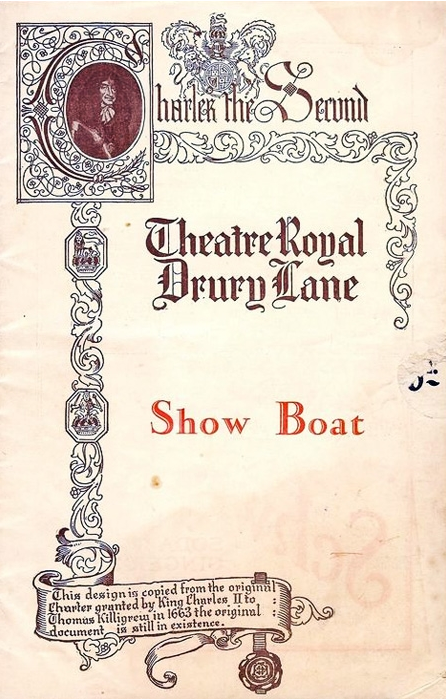
Version 2
Show Boat (1928-05-Drury Lane Theatre-London)
Type de série: Original LondonThéâtre: Drury Lane Theatre (Londres - Angleterre)
Durée : 10 mois
Nombre : 350 représentations
Première Preview : jeudi 03 mai 1928
Première : jeudi 03 mai 1928
Dernière : samedi 02 mars 1929
Mise en scène : Felix Edwardes •
Chorégraphie : Max Scheck •
Producteur :
Avec : Edith Day (Magnolia), Howett Worster (Gaylord Ravenal), Cedric Hardwicke (Cap’n Andy), Marie Burke (Julie La Verne), Viola Compton (Parthy), Paul Robeson (Joe), Alberta Hunter (Queenie), Dorothy Lena (Ellie May), Leslie Sarony (Frank Schultz), Colin Clive (Steve Baker)
Commentaires : This production cut the following: "Goodbye, My Lady Love", "Hey, Feller", and "Kim's Imitations" (with "Eccentric Dance" and "Tap Dance"). "Goodbye, My Lady Love" was replaced with a previous Kern song "How'd You Like to Spoon With Me?". "Kim's Imitations" was replaced with a new song written for Edith Day (who played Magnolia/Kim) called "Dance Away the Night". A song called "Me and My Boss" was written for Paul Robeson as Joe but never performed.

Version 3
Show Boat (1929-05-US National Tour)
Type de série: US TourThéâtre: US Tour ( - Etats-Unis)
Durée : 10 mois 1 semaine
Nombre :
Première Preview : lundi 06 mai 1929
Première : lundi 06 mai 1929
Dernière : dimanche 09 mars 1930
Mise en scène : Oscar Hammerstein II •
Chorégraphie :
Producteur :
Avec : Allan Campbell (Windy), Charles Ellis (Steve), Bert Chapman (Pete), Aunt Jemima (Queenie), Edna May Oliver (Parthy Ann Hawks), Charles Winninger (Cap'n Andy), Eva Puck (Ellie), Sammy White (Frank), Francis X. Mahoney (Rubber Face), Helen Morgan (Julie), Howard Marsh (Gaylord Ravenal), Thomas Gunn (Vallon), Norma Terris (Magnolia), Jules Bledsoe (Joe), Jack Wynn (Faro Dealer), Phil Sheridan (Gambler), Jack Daley (Backwoodsman), Jack Wynn (Jeb), Dorothy Denese (La Belle Fatima), Bert Chapman (Old Sport), Annie Hart (Landlady), Estelle Floyd (Ethel), Annette Harding (Sister), Mildred Schwenke (Mother Superior), Eleanor Shaw (Kim (as a child)), Norma Terris (Kim (as a young woman)), Robert Faricy (Jake), Ted Daniels (Jim), Ted Daniels (Man with Guitar), J. Lewis Johnson (Charlie), Tana Kamp (Lottie), Dagmar Oakland (Dolly), Laura Clairon (Old Lady on Levee), Constance McKenzie, Mary Farrell, Sophie Howard, Nancy Kaye, Adrienne Armand, Lillian Clark, Betty Collette, Betty Junod, Una Val, Pansy Maness, Nellie Mayer, Essie Moore, Clementine Rigeau, Kathryn Ringquist, Rosalyn Smith, Eleanor Tierney, Frances Hope, Maurine Holmes, Dinorah Castillo, Peggy Green, Peggy Udell, Ethel Allen, Rose Gallagher, Hazel Jennings, Helen Chandler, Martha Manners, Tana Kemp, Ethel O'Dell, Annette Harding, Modette Hunt, Dorothy Foster, Mildred Schwenke, John Daly, Ted Daniels, William Ehlers, Dell Fradenburg, William Galpen, Ed Hale, Rees Jenkins, Ralph Knight, Ray Mace, Pat Mann, William Bailey, Joseph Minitello, Earl Sanborn, Phil Sheridan, Jack Wynn, William Lawless
Commentaires : Colonial Theatre (Boston, MA) 6 mai 1929 - 15 juin 1929
Shubert Theatre (Newark, NJ) 23 septembre 1929 - 29 septembre 1929
Illinois Theatre (Chicago, IL) 1 octobre 1929 - ? [16 semaines]
American Theatre (St. Louis, MO) 20 janvier 1930 - ?
Davidson Theatre (Milwaukee, WI) 27 janvier 1930 - ?
Nixon Theatre (Pittsburgh, PA) 17 février 1930 - ?
National Theatre (Washington, D.C.) 24 février 1930 - ?
Ford's Theatre (Baltimore, MD) 3 mars 1930 - ?
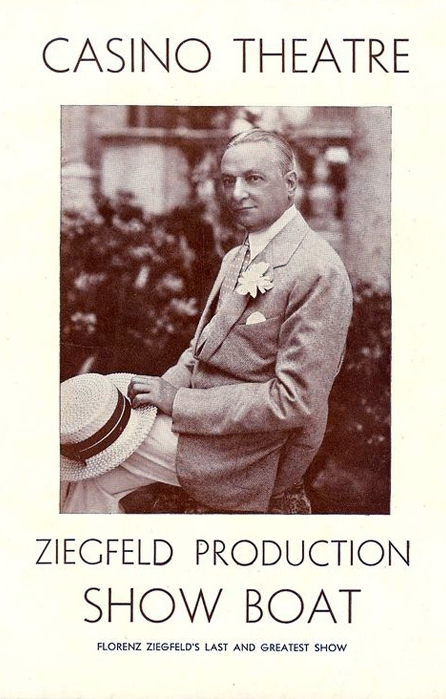
Version 4
Show Boat (1932-05-Casino Theatre-Broadway)
Type de série: RevivalThéâtre: Casino Theatre (7Th Av) (Broadway - Etats-Unis)
Durée : 5 mois
Nombre : 180 représentations
Première Preview : Inconnu
Première : jeudi 19 mai 1932
Dernière : samedi 22 octobre 1932
Mise en scène : Oscar Hammerstein II •
Chorégraphie : Sammy Lee •
Producteur :
Avec : Windy ... Allan Campbell
Steve ... Charles Ellis
Pete ... James Swift
Queenie ... Tess Gardella
Parthy Ann Hawks ... Edna May Oliver
Cap'n Andy ... Charles Winninger
Ellie ... Eva Puck
Frank ... Sammy White
Rubber Face ... Francis X. Mahoney
Julie ... Helen Morgan
Commentaires longs: Commonly referred to as a return engagement, this production of Show Boat was actually a revival. Producer Florenz Ziegfeld had fallen on hard times after a string of six flops in three years (Show Girl, Bitter Sweet, Simple Simon, Smiles, Ziegfeld Follies of 1931, and Hot-Cha!), gambling debts, and the stock market crash. In need of cash, he revived one of his most successful shows.
Ziegfeld took advantage of the crash and it's hardship on actors and was able to round up many of the original principals from the original production.
He decided to use Paul Robeson for Joe instead of Jules Bledsoe (who originated the role). Robeson had been the original choice in 1927 but had been unavailable when rehearsals began. He played the role in the 1928 London production.
For Ravenal, he decided to use then-star Dennis King rather than the original Howard Marsh. Marsh had been criticized in reviews for his wooden acting. King had starred in several Broadway operettas. He was, however, a high baritone and not a tenor. His debonair image, however, was perfect for Ravenal.
Rehearsals began on April 18, 1932.
The top ticket price was $3. Some seats were as low as 50¢.
The production opened cold on Broadway without a tryout tour.
The principals' weekly salaries were:
Helen Morgan (Julie): $1250
Norma Terris (Magnolia): $500
Dennis King (Ravenal): $1000
Edna May Oliver (Parthy): $1000
Eva Puck (Ellie): $1250
Sammy White (Frank): $1250
Charles Winninger: $1000
Tess Gardella (Queenie): $500
Paul Robeson (Joe): $1500
Ziegfeld died on July 22, part way through the run. A.C. Blumenthal took over as producer.
Right after opening, the production was the highest grossing on Broadway at the time. During the summer months, however, business tapered off (as happens with many shows). To keep the show running, the cast agreed to take a salary cut. A few weeks later, they agreed to another cut which reduced their salaries to 50% of what they were at opening. It was clear that the principals agreed to the pay cuts to keep the chorus members employed, since the principals could all have easily gotten more work.
Charles Winninger (Cap'n Andy) planned to reduce his performances when he agreed to star as Captain Henry on the weekly NBC radio series Show Boat. William Kent was to take over Thursday nights but the radio show and Broadway schedule were too much for Winninger. On October 17, Kent took over the role entirely.

Version 5
Show Boat (1932-10-US National Tour)
Type de série: US TourThéâtre: US Tour ( - Etats-Unis)
Durée : 4 mois 2 semaines
Nombre :
Première Preview : lundi 24 octobre 1932
Première : lundi 24 octobre 1932
Dernière : jeudi 09 mars 1933
Mise en scène : Oscar Hammerstein II •
Chorégraphie :
Producteur :
Avec : Allan Campbell (Windy), George Blackwood (Steve), James Swift (Pete), Angeline Lawson (Queenie), Bertha Belmore (Parthy Ann Hawks), William Kent (Cap'n Andy), Eva Puck (Ellie), Sammy White (Frank), Francis X. Mahoney (Rubber Face), Helen Morgan (Julie), Paul Keast (Gaylord Ravenal), Thomas Gunn (Vallon), Norma Terris (Magnolia), Jules Bledsoe (Joe), Jack Daley (Backwoodsman), Gladstone Waldrup (Jeb), Dorothy Denese (La Belle Fatima), James Swift (Old Sport), Annie Hart (Landlady), Estelle Floyd (Ethel), Stella Bailey (Sister), Mildred Schwenke (Mother Superior), Evelyn Eaton (Kim (child)), Mari Helgren (Mary (another child)), Norma Terris (Kim (as a young woman)), Robert Faricy (Jake (Piano Player)), Jack Daley (Jim), Pat Mann (Man with Guitar), J. Louis Johnson (Charlie (Doorman at the Trocadero)), Caja Eric (Lottie), Tana Kamp (Dolly), Laura Clairon (Old Lady on Levee), Bessie Allison, Bertha Fitzhugh Baker, Rachel Beech, J. Mardo Brown, Billie Campbell, Mamie Cartier, Willy Lou Chalfant, Catherine Clark, Walter Costello, Charles Davis, Henry Davis, Leon Diggs, William Ehlers, Caja Eric, Estelle Floyd, Dell Fradenburg, John Fredrik, Ray Giles, Blanche Glenn, Marion Hairston, Edgar Hall, William Haskins, Mae Haygood, Eunice Holmes, Maurine Holmes, Rhogenia Jamison, J. Louis Johnson, Charlotte Junius, Tana Kamp, Angeline Lawson, James Lillard, Henrietta Lovelace, Herbert Lyle, Pat Mann, Rose Mariella, Richard McAllister, Dolly McCormick, James McKay, John Mobley, Ethel Moses, Lucia Moses, Joseph Olney, Ann Lee Patterson, Pauline Pennell, Inez Persand, Lancelot Pinard, Hattie King Reavis, Wilburn Riviere, Elsie Rossi, Jennie Salmons, Earle Sanborn, Mildred Schwenke, Phil Sheridan, Maude Simmons, Charles Spencer, Wen. Talbert, Lucille Taylor, Wynn Terry, Tillie Thomas, Archie Thomson, Lee Timmans, Gladstone Waldrup, Billie Wallace, Elida Webb, Charles Willis
Commentaires : Shubert Theatre (Boston, MA) 24 octobre 1932 - ?
Forrest Theatre (Philadelphia, PA) 7 novembre 1932 - ?
National Theatre (Washington, D.C.) 14 novembre 1932 - ?
Ford's Theatre (Baltimore, MD) 21 novembre 1932 - ?
Nixon Theatre (Pittsburgh, PA) 28 novembre 1932 - ?
Shubert Theatre (Cincinnati, OH) 4 décembre 1932 - 10 décembre 1932
Hanna Theatre (Cleveland, OH) 26 décembre 1932 - ?
Cass Theatre (Detroit, MI) 2 janvier 1933 - ?
Auditorium Theatre (Chicago, IL) 8 janvier 1933 - ? [3 weeks]
Balaban and Katz Chicago Theatre (Chicago, IL) 3 février 1933 - ?
Loew's State Theatre (Cleveland, OH) 10 février 1933 - ?
Capitol Theatre (New York, NY) 24 février 1933 - ?
Leow's Metropolitan Theatre (Brooklyn, NY) 3 mars 1933 - 9 mars 1933
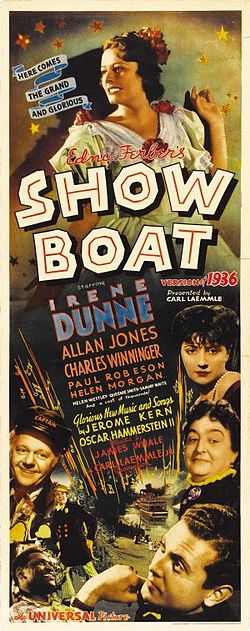
Version 6
Show Boat (1936-05-Film)
Type de série: FilmThéâtre: *** Film (*** - ***)
Durée :
Nombre :
Première Preview : Inconnu
Première : dimanche 17 mai 1936
Dernière : Inconnu
Mise en scène : James Whale •
Chorégraphie :
Producteur :
Avec : Irene Dunne / Allan Jones / Charles Winninger / Paul Robeson / Helen Morgan / Helen Westley / Queenie Smith / Hattie McDaniel / Donald Cook / Sammy White
Commentaires longs: The three new songs written by Kern and Hammerstein for the 1936 film are:
"I Have The Room Above Her" (a duet for Magnolia and Ravenal, sung in a new scene not included in the original play, but performed approximately in the spot in which the song I Might Fall Back On You was sung by Frank and Ellie, the comic dance team, in the show. "I Might Fall Back On You" is not sung in the film; a tiny fragment of it is heard instrumentally in the New Year's Eve sequence.) Harold Prince included "I Have the Room Above Her" in his 1993 stage revival of Show Boat.
"Gallivantin' Around" (a blackface number sung onstage by Magnolia, in place of the orchestral Olio Dance performed by Frank in the original play). An instrumental version of "Gallivantin' Around" is played in the film's new final scene.
"Ah Still Suits Me" (a comic duet for Joe and Queenie, written especially to expand both their roles, and sung in a new scene specially written for the film) This song was also included in the 1989 Paper Mill Playhouse stage revival of Show Boat, telecast by PBS.
Production history
This film version of Show Boat stars Irene Dunne as Magnolia and Allan Jones as Ravenal, with Charles Winninger, Paul Robeson, Helen Morgan, Helen Westley, Queenie Smith, Sammy White, Donald Cook, Arthur Hohl, and Hattie McDaniel. It was directed by Frankenstein / Bride of Frankenstein director James Whale, who tried to bring as many people from the stage production as he could to work on the film. Winninger, Morgan and White had all previously played their roles in both the original 1927 stage production and the 1932 stage revival of the musical. Robeson, for whom the role of Joe was actually written, had appeared in the show onstage in London in 1928 and in the Broadway revival of 1932. Dunne had been brought in to replace Norma Terris, the original Magnolia, in the touring version of the show, and had toured the U.S. in the role beginning in 1929. Francis X. Mahoney, who played the brief role of the comic stagehand "Rubber Face" Smith, had also starred in the original production and in the 1932 Broadway revival, and would repeat his role in the 1946 Broadway revival of Show Boat, two years before his death.
The 1936 film also enlisted the services of the show's original orchestrator, Robert Russell Bennett, and its original conductor, Victor Baravalle. The screenplay for the film was written by Hammerstein.
The songs were performed and staged in a manner very similar to the way they were done in the original stage version, not counting the three new songs written for the film, of course. Many of the show's original vocal arrangements (by an uncredited Will Vodery) were retained in the film. "Why Do I Love You?" had been filmed in a new setting - inside a running automobile - but was cut just before the film's release to tighten the running time. There is no word on whether or not this footage has survived.
Due to time constraints, Whale was forced to delete much of his ending sequence, including a "modern" dance number to contrast with the romantic, "Old South" production number we see Kim starring in, and which was intended to highlight African-American contributions to dance and music.
According to film historian Miles Kreuger in his book Show Boat: The History of a Classic American Musical, great care was taken by director James Whale to ensure a feeling of complete authenticity in the set and costume design for the 1936 film.
Reception
The 1936 version of Show Boat is considered by many film critics to be one of the classic film musicals of all time, and one of the best stage-to-film adaptations ever made. Frank S. Nugent of the New York Times called it "one of the finest musical films we have seen".
Ten numbers from the stage score are actually sung, with four others heard only as background music, and a tiny, almost unrecognizable fragment of the song "I Might Fall Back on You" is heard instrumentally at the beginning of the New Year's Eve sequence. Except for three new dialogue scenes, the final ten minutes of the film, and the three additional songs written for the movie by Kern and Hammerstein, the 1936 Show Boat follows the stage musical extremely closely, unlike the 1929 film and the 1951 version released by MGM. It is so faithful that even several instrumental pieces not by Kern which are regularly included as part of the show's score are retained in the film. [6] The film also retains much of the comedy in the show.
In 1996, this version of Show Boat was selected for preservation in the United States National Film Registry by the Library of Congress as being "culturally, historically, or aesthetically significant".
Temporary withdrawal from circulation
Show Boat was successful at the box office, but was withdrawn from circulation in the 1940s, after MGM bought the rights so that they could film their own Technicolor remake; however, MGM's version did not begin filming until 1950, and was released in the summer of 1951. The fact that Paul Robeson, who played Joe in the 1936 version, was blacklisted in 1950 further assured that the 1936 film would not be seen for a long time, and it was not widely seen again until after Robeson's death in 1976. In 1983 it made its debut on cable television, and a few years later, on PBS. It was subsequently shown on TNT and now turns up from time to time on TCM. It was made available on VHS beginning in 1990, but it has yet to be released on an authorized DVD, although a Brazilian company, Classicline, released a DVD version in 2003. For several years, Warner Brothers, through which Turner now releases its official DVDs, has been promising a comprehensive set of all three Show Boat films, but as of August 2012, this has still not come to pass, though there is a great demand for an official DVD release.
The Voyager Company, under its Criterion Collection Label, released two versions on laserdisc in 1989 of the 1936 version. One was a special edition with extras that included the history of show boats in general and its stage and film history, and the other was a movie only version. MGM/UA Home Video released the 1929, 1936 and 1951 versions, as well as the Show Boat sequence from Till the Clouds Roll By, as The Complete Show Boat collection on laserdisc in 1995. The 1929 version was restored and this release is the most complete version available. The transfer for the 1936 version is the same as the Criterion Collection and the 1951 was from the restored stereo release MGM had done earlier. Although an analog format, the laserdisc release is the only digital version of the 1929 and 1936 versions and is out of print.
In 2006 the 1936 Show Boat ranked #24 on the American Film Institute's list of best musicals.
Today, Turner Entertainment owns the film as part of the pre-1986 MGM library, with fellow Time Warner division Warner Bros. Handling distribution.

Version 7
Show Boat (1940-05-Philharmonic Auditorium-Los Angeles)
Type de série: RevivalThéâtre: Philharmonic Auditorium (Los Angeles - Etats-Unis)
Durée :
Nombre : 8 représentations
Première Preview : lundi 13 mai 1940
Première : lundi 13 mai 1940
Dernière : samedi 18 mai 1940
Mise en scène : Zeke Colvan •
Chorégraphie :
Producteur :
Avec : Norman Fusier (Windy), Victor Adams (Steve Baker), Edward Fisher (Pete), Bertha Powell (Queenie), Winifred Harris (Parthy Ann Hawks), Guy Kibbee (Cap'n Andy), Helen Lynd (Ellie May Chipley), Sammy White (Frank Schultz), Francis X. Mahoney (Rubber Face), Helen Morgan (Julie LaVerne), John Boles (Gaylord Ravenal), Jack Rutherford (Sheriff Vallon), Norma Terris (Magnolia Hawks), Paul Robeson (Joe), Jim Boudwin (Faro Dealer), Jack Daley (Backwoodsman), Don Kent (Jeb), Janet Graves (La Belle Fatima), Edward Fisher (Old Sport), Evelyn Burwell (Ethel), Kathleen Smith (i) (Show Boat 8), Ava Josette (Mother Superior), Babs Savage (Kim (as a child)), Le Roy Pryor (Jake), Jack Daley (Jim), Rugby Curtis (Man with Guitar), Jester Hairston (Charlie), Muriel Goodspeed (Lottie), Marguerite Merlin (Dolly), Lucille Dale (Hazel), Norma Terris (Kim (as a young woman)), Kathleen Smith (i) (Old Lady on Levee), Hall Johnson Singers (Chorus)
Commentaires : Dernière appartition dans Show Boat de trois stars qui ont rendus leurs rôles mythiques: Paul Robeson (Joe), Norma Terris (Magnolia) et Helen Morgan (Julie).
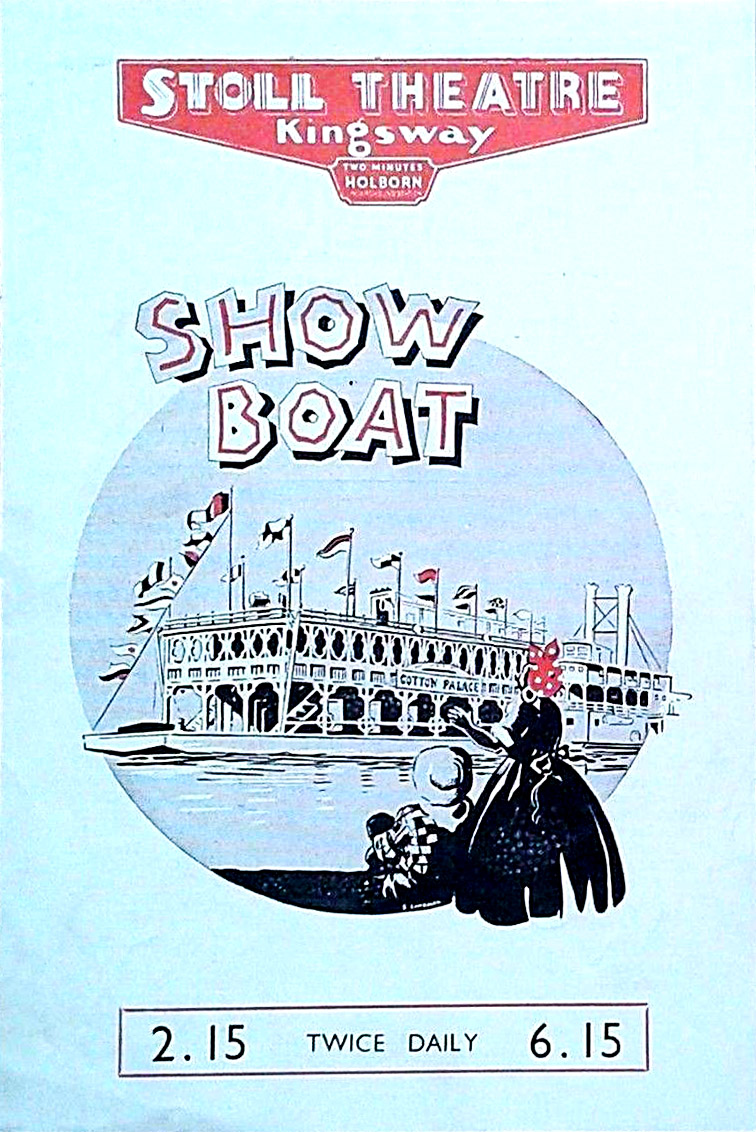
Version 8
Show Boat (1943-04-Stoll Theatre-London)
Type de série: RevivalThéâtre: Peacock Theatre (Londres - Angleterre)
Durée : 5 mois
Nombre : 264 représentations
Première Preview : Inconnu
Première : samedi 17 avril 1943
Dernière : samedi 18 septembre 1943
Mise en scène : James Moran •
Chorégraphie : Max Rivers •
Producteur :
Avec : Gwenyth Eascelles (Magnolia), Bruce Carfax (Gaylord Ravenal), Mark Daly (Cap ’n Andy), Pat Taylor (Julie La Verne), Hester Paton Brown (Parthy), Malcolm McEachern “Mr Jetsam” (Joe), Lucille Benstead (Queenie), ylvia Kcllaway (Ellie May), Leslier Kellaway (Frank Schultz), Robert Elson (Steve Baker)

Version 9
Show Boat (1944-05-Philharmonic Auditorium-Los Angeles)
Type de série: RevivalThéâtre: Philharmonic Auditorium (Los Angeles - Etats-Unis)
Durée : 1 semaine
Nombre : 16 représentations
Première Preview : lundi 08 mai 1944
Première : lundi 08 mai 1944
Dernière : samedi 20 mai 1944
Mise en scène : Zeke Colvan •
Chorégraphie :
Producteur :
Avec : Herbert Evans (Windy), Wilton Clary (Steve Baker), Edward Bushman (Pete), Edith Wilson (Queenie), Bertha Belmore (Parthy Ann Hawks), Gene Lockhart (Cap'n Andy), Colette Lyons (Ellie May Chipley), Sammy White (Frank Schultz), Johnny Silver (Rubber Face), Carol Bruce (Julie LaVerne), Lansing Hatfield (Gaylord Ravenal), Jack Rutherford (Sheriff Vallon), Marthe Errolle (Magnolia), Todd Duncan (Joe), Jack Saunders (Faro Dealer), Leland Ledford (Gambler), Jack Daley (Backwoodsman), Frank Breneman (Jeb), Diane Meroff (La Belle Fatima), Michael Austin (i) (Old Sport), Evelyn Butwell (Ethel), Marian Douglas (Show Boat 8), Elaine Haslett (Mother Superior), Carol Field (Kim (child)), David Smith (i) (Jake), Jack Daley (Jim), Jack Garland (Man with Guitar), George Bryant (Charlie), Leonne Hall (Lottie), Marie Hubert (Dolly), Marthe Errolle (Kim (young woman)), Marian Douglas (Old Lady on Levee)
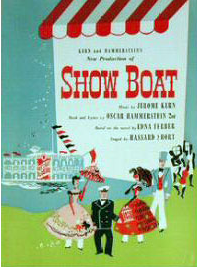
Version 10
Show Boat (1946-01-Ziegfield Theatre-Broadway)
Type de série: RevivalThéâtre: Ziegfield Theatre (Broadway - Etats-Unis)
Durée : 1 an 1 mois
Nombre : 418 représentations
Première Preview : Inconnu
Première : samedi 05 janvier 1946
Dernière : mardi 04 février 1947
Mise en scène :
Chorégraphie :
Producteur :
Avec : Windy ... Scott Moore
Steve ... Robert Allen
Pete ... Seldon Bennett
Queenie ... Helen Dowdy
Parthy Ann Hawks ... Ethel Owen
Captain Andy ... Ralph Dumke
Ellie ... Colette Lyons
Frank ... Buddy Ebsen
Rubber Face ... Francis Mahoney
Julie ... Carol Bruce
Commentaires longs: Jerome Kern's producer credit was posthumus as he died a couple of months before this production opened.
The playbill contained the following note from Oscar Hammerstein 2nd.:
Mr. Kern and I have kept the libretto and score of "Show Boat" substantially as they were when originally written in 1927. We have eliminated one "front scene" and three minor musical numbers. We have added one new song in the last scene of the play, "Nobody Else But Me." This takes the place of a series of imitations of stars of the Twenties performed in this spot by the original Magnolia, Miss Norma Terris.
I am particulalry anxious to point out that the lyric for the song "Bill" was written by P. G. Wodehouse. Although he has always been given credit in the program, it has frequently been assumed that since I wrote all the other lyrics for "Show Boat," I also wrote this one, and I have had praise for it which belongs to another man.
The production cost was estimated at $275,000 with 75% of it being supplied by Metro-Golwyn-Mayer.

Version 11
Show Boat (1947-10-US National Tour)
Type de série: US TourThéâtre: US Tour ( - Etats-Unis)
Durée : 8 mois 1 semaine
Nombre :
Première Preview : lundi 20 octobre 1947
Première : lundi 20 octobre 1947
Dernière : samedi 26 juin 1948
Mise en scène : Oscar Hammerstein II • Hassard Short •
Chorégraphie :
Producteur :
Avec : George Spellman (Windy), Fred Brookins (Steve), Gerald Prosk (Pete, Jeb), Helen Dowdy (Queenie), Ruth Gates (Parthy Ann Hawks), Billy House (Captain Andy), Clare Alden (Ellie), Sammy White (Frank), Gordon Alexander (Rubber Face), Carol Bruce (Julie), Norwood Smith (Gaylord Ravenal), Fred Ardath (Vallon), Pamela Caveness (Magnolia), William C. Smith (Joe), Howard Frank (Backwoodsman), La Verne French (Sam, Dahomey King), Gloria Smith (Sal), Walter Russell (Barker, Drunk), Sylvia Myers (Fatima), Robert Fleming (Sport), Sara Floyd (Landlady), Assota Marshall (Ethel), Lorraine Waldman (Mother Superior), Danice Dodson (Kim [as a child]), King Brill (Jake), Seldon Bennett (Jim), Albert McCary (Man with Guitar), Walter Mosby (Doorman at Trocadero), Sara Dillon (Lottie), Elaine Hume (Dolly), Janet Van Derveer (Sally), Ann Lloyd (Old Lady on Levee); Singers: Sybol Cain, Clarice Crawford, Sara Dillon, Betty Graeber, Marion Hairston, Kate Hall, Elaine Hume, Charlotte Junius, Assota Marshall, Sylvia Myers, Eleyn Paul, Eulabel Riley, Dee Sherman, Janet Vanderveer, Lorraine Waldman, Jerome Addison, Gilbert Adkins, Gordon Alexander, Ivory Bass, Henry Davis, William Cole, Clarence Jones, Albert McCary, Walter Mosby, Walter Russell, William Sol, Charles Welch, Leo Norman, Robert Flavelle, Francis Fleming, Henry Hamilton; Dancers: Eloise Hill, Evelyn Pilcher, Gloria Smith, Alma Sutton, Isaiah Clark, James Hunt, Reginald Ridgley, George Thomas, James Fields
Commentaires : 14 villes du 20 octobre 1947 au 26 juin 1948

Version 12
Show Boat (1948-09-US National Tour)
Type de série: US TourThéâtre: US Tour ( - Etats-Unis)
Durée : 7 mois 3 semaines
Nombre :
Première Preview : mardi 07 septembre 1948
Première : mardi 07 septembre 1948
Dernière : samedi 30 avril 1949
Mise en scène : Oscar Hammerstein II • Hassard Short •
Chorégraphie :
Producteur :
Avec : George Spellman (Windy), Fred Brookins (Steve), Gerald Prosk (Pete, Jeb), Helen Dowdy (Queenie), Ruth Gates (Parthy Ann Hawks), Billy House (Captain Andy), Clare Alden (Ellie), Sammy White (Frank), Gordon Alexander (Rubber Face), Carol Bruce (Julie), Norwood Smith (Gaylord Ravenal), Fred Ardath (Vallon), Pamela Caveness (Magnolia), William C. Smith (Joe), Howard Frank (Backwoodsman), La Verne French (Sam, Dahomey King), Gloria Smith (Sal), Walter Russell (Barker, Drunk), Sylvia Myers (Fatima), Robert Fleming (Sport), Sara Floyd (Landlady), Assota Marshall (Ethel), Lorraine Waldman (Mother Superior), Danice Dodson (Kim [as a child]), King Brill (Jake), Seldon Bennett (Jim), Albert McCary (Man with Guitar), Walter Mosby (Doorman at Trocadero), Sara Dillon (Lottie), Elaine Hume (Dolly), Janet Van Derveer (Sally), Ann Lloyd (Old Lady on Levee); Singers: Sybol Cain, Clarice Crawford, Sara Dillon, Betty Graeber, Marion Hairston, Kate Hall, Elaine Hume, Charlotte Junius, Assota Marshall, Sylvia Myers, Eleyn Paul, Eulabel Riley, Dee Sherman, Janet Vanderveer, Lorraine Waldman, Jerome Addison, Gilbert Adkins, Gordon Alexander, Ivory Bass, Henry Davis, William Cole, Clarence Jones, Albert McCary, Walter Mosby, Walter Russell, William Sol, Charles Welch, Leo Norman, Robert Flavelle, Francis Fleming, Henry Hamilton; Dancers: Eloise Hill, Evelyn Pilcher, Gloria Smith, Alma Sutton, Isaiah Clark, James Hunt, Reginald Ridgley, George Thomas, James Fields

Version 13
Show Boat (1951-07-Film)
Type de série: FilmThéâtre: *** Film (*** - ***)
Durée :
Nombre :
Première Preview : Inconnu
Première : mardi 17 juillet 1951
Dernière : Inconnu
Mise en scène : George Sidney •
Chorégraphie :
Producteur :
Avec : Magnolia Hawks ... Kathryn Grayson / Gaylord Ravenal ... Howard Keel / Julie LaVerne ... Ava Gardner / Cap'n Andy Hawks ... Joe E. Brown / Ellie May Shipley ... Marge Champion / Frank Schultz ... Gower Champion / Steven Baker ... Robert Sterling / Parthy Hawks ... Agnes Moorehead / Pete ... Leif Erickson / Joe ... William Warfield / Julie LaVerne (singing) ... Annette Warren
Commentaires longs: The 1951 film version of Show Boat was adapted from the original 1927 stage musical by John Lee Mahin after Jack McGowan and George Wells had turned in two discarded screenplays, and was directed by George Sidney. Filmed in the typical MGM lavish style, this version is the most financially successful of the film adaptations of the play: one of MGM's most popular musicals, it was the third most profitable film of 1951.
Although arguably one of the studio's less inventive film musicals, the film is more overtly cinematic than the 1936 version — the boat is seen winding its way down the river several times, and there are two scenes in which the boat is shown leaving the dock, while the 1936 film version is so faithful in following the stage play that the boat is seen moving only at the very beginning of the film, when it arrives at a river town.
The staging of several of the songs is more elaborate than in the 1936 version.
In the 1936 film, Magnolia and Ravenal sing the song "Make Believe" just as they do in the stage version of the musical, with Ravenal standing on a river piling and Magnolia standing on the upper deck of the boat, in the manner of the Romeo and Juliet balcony scene. He does not even enter the boat until during the later "miscegenation" scene, just as he does in the stage version. In the 1951 film, Ravenal climbs on board the boat as soon as he first walks up to it, and then meets Magnolia for the first time. He follows her to the upper deck to sing the song, and the two walk around the deck while singing the last few lines.
When Julie and several other characters sing "Can't Help Lovin' Dat Man" in the 1936 film, they sing it inside the boat, in the kitchen, (just as in the stage version) with only the last moments of the song being sung on the deck. In the 1951 film, the song is sung entirely on the ship's upper deck, taking full advantage of the surrounding scenery. The boat's kitchen is never shown in the 1951 film.
In the 1936 film, just as in the stage version, Joe and the other dock workers sing "Ol' Man River" while sitting on crates and cotton bales on the levee, and the song is made cinematic through the use of an elaborate expressionistic montage of levee workers performing their tasks. In the 1951 film, Joe sings one refrain of the song while standing on the levee and then walking to the dock, and the last part of the song is sung by Joe standing on the boat's lower deck as it winds its way down the river, accompanied by an offscreen chorus.
In the 1936 film, when Julie sings "Bill", she stands next to a piano and never changes her position. (She sat on top of the piano in the stage version.) In the 1951 film, Julie walks around the piano while singing it and leans against the steps of the Trocadero nightclub to sing part of the song.
However, in the 1936 film, the staging of the show boat parade in the opening scenes was more elaborate than in the 1951 version. In the 1951 version, the parade members (as well as the actors) stay on the dock, while in the 1936 version, the parade is shown marching down the main street of the town, a huge set constructed by the Universal Pictures craftsmen. The introduction of the show boat company to the crowd is also held there.
The 1951 film was the first film version of Show Boat not to feature Robert Russell Bennett's stage orchestrations in one form or another (the orchestrations in this film were done by Conrad Salinger, Alexander Courage, and the uncredited Robert Franklyn).

Version 14
Show Boat (1954-04-New York City Center-New York)
Type de série: RevivalThéâtre: New York City Center (Broadway - Etats-Unis)
Durée : 6 mois 3 semaines
Nombre : 20 représentations
Première Preview : jeudi 08 avril 1954
Première : jeudi 08 avril 1954
Dernière : dimanche 31 octobre 1954
Mise en scène : William Hammerstein •
Chorégraphie :
Producteur :
Avec : Arthur Newman (Windy McLain, Backwoodsman), Robert Gallagher (Steve), Boris Aplon (Pete, Jim), Helen Phillips (Queenie), Marjorie Gateson (Parthy Ann Hawkes), Stanley Carlson (Captain Andy), Diana Drake (Ellie), Jack Albertson (Frank), Thomas R. Powell (Rubberface), Helena Bliss (Julie), Robert Rounseville (Gaylord Ravenal), Lawrence Haynes (Vallon, Jeb), Laurel Hurley (Magnolia), William C. Smith (Joe), Thomas R. Powell (Barker), Ann Barry (Fatima), Charles Kuestner (Second Barker, Man with Guitar, Drunk), Roland Miles (Sport), Meri Miller (Strong Woman), Sara Floyd (Landlady, Old Lady on the Levee), Gloria Wynder (Ethel), Milton Lyon (Jake), Bill Smith (Doorman at Trocadero), Ellen Gleason (Mother Superior), Barbara Ford (Nun), Adele Newton (Kim [as a child]), Marilyn Bladd (Lottie), Dorothy Mirr (Dolly), Gloria Sacks (Sally), Greta Thompson (Kim [as an adult]); Congress of Beauties: Joanne Budill, DeAnn Mears, Peg Shirley, Barbara Sohmers; Children: Ginger Brooks, Georgianna Catal, Claudia Crawford, Dale Dennard, Leonard Grinnage, Joan Nickel, Bonnie Sawyer; Singers: Benjamin Bajorek, Marilyn Bladd, Adelaide Boatner, Eugene S. Brice, Doryce Brown, Walter P. Brown, Joseph E. Crawford, Dawin Emanuel, Rina Falcone, John Fleming, Barbara Ford, Mareda Gaither, Ellen Gleason, Russell Goodwin, Louise Hawthorne, Ida Frances Johnson, Charles Kuestner, Sheila Mathews, James Martindale, William McDaniel, Roland Miles, Dorothy Mirr, John Neilsen, Benjamin Plotkin, Madeline Porter, William W. Reynolds, Gloria Sacks, Christine Spencer, William Starling, Joseph Tanner, Frederick L. Thomas, Greta Thormsen, DeLoyd Tibbs, Rodester Timmons, Clyde S. Turner, Rose Virga, Gloria Wynder
Commentaires : > 3 représentations produites par le NYCO (New York City Opera): du 8/4 au 2/5/1954.
> 15 représentations produites par le NYCLOC (New York City Light Opera Company): du 5/5 au 16/5/1954
> 2 représentations (reprise) produites par le NYCO (New York City Opera): les 28 et 31/10/1954

Version 15
Show Boat (1961-04-New York City Center-New York)
Type de série: RevivalThéâtre: New York City Center (Broadway - Etats-Unis)
Durée : 1 semaine
Nombre : 14 représentations
Première Preview : mercredi 12 avril 1961
Première : mercredi 12 avril 1961
Dernière : dimanche 23 avril 1961
Mise en scène : Dania Krupska •
Chorégraphie :
Producteur :
Avec : William Coppola (Pete, Jake), Scott Moore (Windy McLain), Carol Brice (Queenie), Joe E. Brown (Cap’n Andy), Isabella Hoopes (Parthy Ann Hawks), Jane Kean (Ellie), Richard France (Frank), Anita Darian (Julie), Herbert Fields (Steve), Robert Rounseville (Gaylord Ravenal), John J. Martin (Sheriff Ike Vallon), Jo Sullivan (Magnolia; also Magnolia in the 1920s), Andrew Frierson (Joe), J. Patrick Carter (Rubberface, Man With Guitar), Norman A. Grogan (Backwoodsman), Feodore Tedick (Jeb, Headwaiter), Carmen Lindsay (Miss Parkington), Henry Lawrence (Barkers, Jim), Jack Rains (Old Sport), Alyce Webb (Ethel), Claire Waring (Landlady), John Smith (Al), Sherry McCutcheon (Mazie), John Cooke (Pianist), Ned Wright (Charley), Miriam Lawrence (Mother Superior), Helen Guile (Kim [as a child]), Mara Wirt (Dolly), Sarah Floyd (Old Lady on Levee); Belles: Beverly Evans, Helen Guile, Miriam Lawrence, Carmen Lindsay, Hanna Owen, Betty Jane Schwering, Mara Wirt, Maggie Worth, Mimi Alexander, Margery Beddow, Geralyn Donald, Ellen Halpin, Linda Howe, Bettye Jenkins, Sherry McCutcheon, Barbara Monte; Beaux: John Bessinger, Lawrence Bogue, William Coppola, J. Patrick Carter, Norman A. Grogan, Henry Lawrence, Kellis Miller, Jack Rains, John J. Smith, Feodore Tedick, Todd Butler, Garold Gardner, Eric Kristen, Ronnie Snook; Jubilee Singers: Issa Arnal, Ruby Green Aspinall, Kay Barnes, Claretta Freeman, H. Scott Gibson, Joli Gonsalves, Robert Henson, Wanza King, Mary Louise, Rosalie Maxwell, Caryl Paige, Charles Scott, Alyce Webb, Arthur Williams, Ned Wright; Jubilee Dancers: Leu Comacho, Julius Fields, LaVinnia Hamilton, Nathaniel Horne, Bernard Johnson, Jan Aubrey Mickens, Joan Peters, Harold Pierson, Ronald Platts, Ella Thompson, Glory Van Scott, Myrna White
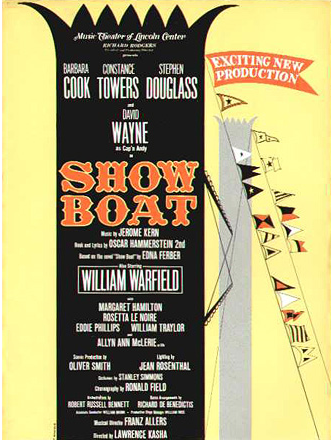
Version 16
Show Boat (1966-07-New York State Theatre-New York)
Type de série: RevivalThéâtre: Lincoln Center for the Performing Arts (New-York - Etats-Unis)
Durée : 1 mois 3 semaines
Nombre : 64 représentations
Première Preview : Inconnu
Première : mardi 19 juillet 1966
Dernière : samedi 10 septembre 1966
Mise en scène : Lawrence Kasha •
Chorégraphie : Ron Field •
Producteur :
Avec : Bob La Crosse (Rubberface), David Wayne (Captain Andy), David Thomas (Windy), William Warfield (Joe), Rosetta Le Noire (Queenie), Allyn Ann McLerie (Ellie), Eddie Phillips (Frank), Margaret Hamilton (Parthy Ann Hawks), Bob Monroe (Pete), Constance Towers (Julie), William Traylor (Steve), Stephen Douglass (Gaylord Ravenal), Barton Stone (Vallon, Jim), Barbara Cook (Magnolia), Neil McNelis (Backwoodsman, Third Barker), Jess Green (Jeb), George McWhorter (First Barker), Doug Spingler (Strong Woman), Garrett Morris (Second Barker), Congress of Beauties: Emilina Escariz, Rita O’Connor, Nancy Van Rijn, Carol Hanzel, Sally Neil (Fatima), Helen Noyes (Landlady, Old Lady on Levee), Joyce McDonald (Ethel), Frances Haywood (Sister), Mary Manchester (Mother Superior), Maureen McNabb (Kim), Clyde Walker (Jake), Paul Adams (Man with Guitar), Edward Taylor (Doorman at Trocadero), John Roberson (Drunk), Martha Danielle (Lottie), Trudy Wallace (Dolly), Frances Buffalino (Sally), Judith Keller (Maisie), Barbara Lindner (A Girl), Dale Westerman (A Man); Female Dancers: Emilina Escariz, Lois Etelman, Carol Hanzel, Vivian Houston, Eileen Lawlor, Sally Neal, Rita O’Connor, Carol Perea, Nancy Van Rijn; Male Dancers: Bryant Baker, Allan Byrns, Peter DeNicola, Ronald Dennis, Bob Hall, Bob La Crosse, Donald Mark, Robert St. John, Doug Spingler; Female Singers: Phyllis Bash, Frances Buffalino, Jane Coleman, Martha Danielle, Dolores Godwin, Frances Haywood, Ernestine Jackson, Judith Keller, Mary Manchester, Barbara Lindner, Joyce McDonald, Estella Munson, Geraldine Overstreet, Lorice Stevens, Trudy Wallace; Male Singers: Paul Adams, Donald Coleman, Ray Duval, Scott Gibson, Jess Green, Vincent Henry, Richard Kahn, James Kelley, James Kennon-Wilson, George McWhorter, Laried Montgomery, Garrett Morris, Garwood Perkins, John Roberson, Alan Sanderson, Richard Sparks, Edward Taylor, Clyde Walker, Dale Westerman, Joe Williams, Lee Winston; Children: Paul Dwyer, Michael Grady, Lisa Huggins, Jeanne Ladomirak, William Sims
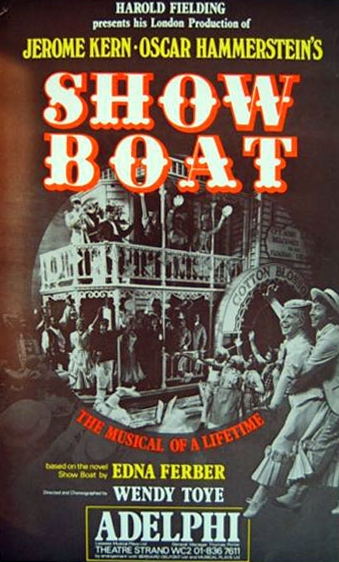
Version 17
Show Boat (1971-07-Adelphi Theatre-London)
Type de série: RevivalThéâtre: Adelphi Theatre (Londres - Angleterre)
Durée : 2 ans 2 mois
Nombre : 910 représentations
Première Preview : vendredi 09 juillet 1971
Première : jeudi 29 juillet 1971
Dernière : samedi 29 septembre 1973
Mise en scène : Wendy Toye •
Chorégraphie : Wendy Toye •
Producteur :
Avec : Cleo Laine (Julie), Andre Jobin (Ravenal), Lorna Dallas (Magnolia), Thomas Carey (Joe), Kenneth Nelson, Derek Royles, Pearl Hackney, Jan Hunt, Ena Cabayo, John Larsen
Commentaires : The first London production featured Edith Day, Cedric Hardwicke and Paul Robeson. The first revival in London was in 1943 with Gwyneth Lascelles and Bruce Carfax. This second revival was the longest running of them all so far.

Version 18
Show Boat (1983-04-Uris Theatre-Broadway)
Type de série: RevivalThéâtre: Gershwin Theatre (Broadway - Etats-Unis)
Durée : 2 mois
Nombre : 5 previews - 73 représentations
Première Preview : mardi 19 avril 1983
Première : dimanche 24 avril 1983
Dernière : dimanche 26 juin 1983
Mise en scène : Michael Kahn •
Chorégraphie : Dorothy Danner •
Producteur :
Avec : Windy ... Richard Dix
Steve ... Wayne Turnage
Pete ... Glenn Martin
Queenie ... Karla Burns
Parthy Ann Hawks ... Avril Gentles
Captain Andy ... Donald O'Connor
Ellie ... Paige O'Hara
Frank ... Paul Keith
Mahoney ... Randy Hansen (i)
Julie ... Lonette McKee
Commentaires longs: In 1981, John McGlinn urged the Houston Grand Opera to use the original 1927 orchestrations (which had recently been discovered in the Queens warehouse of The Rodgers & Hammerstein Organization). They hired him to construct a version as close to the 1927 version as possible at that time.
However, following year, a cache of musical theatre scripts, scores and orchestral parts were discovered in Warner Brothers' warehouse in Secaucus, NJ, including materials from the 1927 Show Boat. Because of the schedule of the production and the rights that needed to be sorted out as to who owned the material, the newly discovered materials could not be used.

Version 19
Show Boat (1989-05-Paper Mill Playhouse-Milburn)
Type de série: RevivalThéâtre: Paper Mill Playhouse (Milburn - Etats-Unis)
Durée : 1 mois 1 semaine
Nombre :
Première Preview : mercredi 17 mai 1989
Première : mercredi 17 mai 1989
Dernière : dimanche 25 juin 1989
Mise en scène : Robert Johanson •
Chorégraphie : Sharon Halley •
Producteur :
Avec : Robert Jensen (Steven Baker), Monte Ralstin (Pete Gavin), Ellia English (Queenie), Marsha Bagwell (Parthy Ann Hawks), Lawrence Vincent (Windy McLain), Eddie Bracken (Cap'n Andy), Lenora Nemetz (Ellie May Chipley), Lee Roy Reams (Frank Schultz), Shelly Burch (Julie LaVerne), Richard White (Gaylord Ravenal), Michael McCarty (Ike Vallon), Rebecca Baxter (Magnolia Hawks), P. L. Brown (Joe), Patti Allison (Mrs. O'Brien), Lauren Gaffney (Young Kim), Phil Hall (Jake), Larry Grey (Jim), Rebecca Baxter (Kim Ravenal), Fred Anderson, Henri Leon Baker, Shell M. Benjamin, Eva Breul, Cheryl Burr, Gregory Butler, Deborah Cole, Sarah Downs, Lothair Eaton, Harriett D. Foy, Malcolm Gets, Jerry Godfrey, Eric Goodwin, Jeffery C. Ferguson, Allison Gray, Kristin Hennessy, La Shonda Hunt, Logan Jordan, David Koch, Kris Koop, Greg Lloyd, Ruth Gottschall, Kenneth Nichols, Ken Shepski, Cynthia Thomas, Laurie Williamson, Wardell Woodard, Jim Mara
Commentaires : Le spectacle a été capté et diffusé sur PBS le 27 octobre 1989
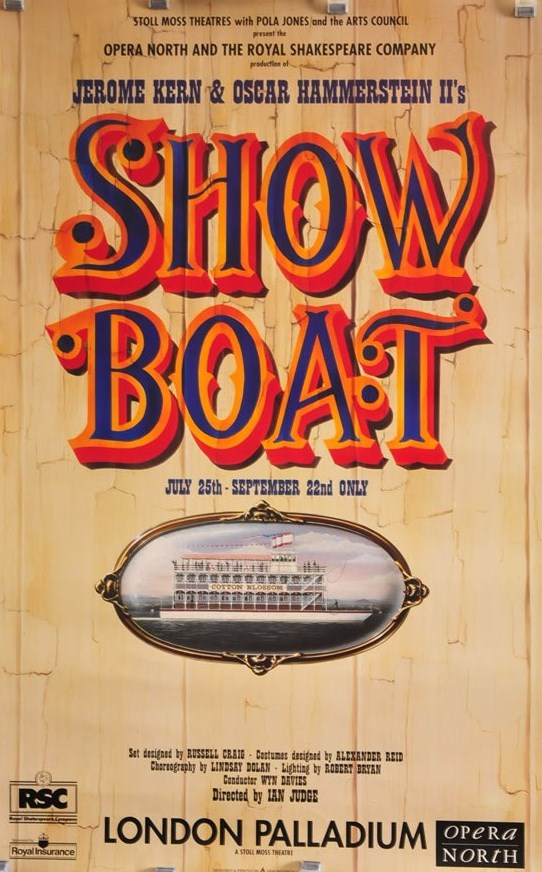
Version 20
Show Boat (1990-08-Palladium Theatre-London)
Type de série: RevivalThéâtre: Palladium Theatre (Londres - Angleterre)
Durée : 1 mois 3 semaines
Nombre : 76 représentations
Première Preview : mercredi 25 juillet 1990
Première : mercredi 01 août 1990
Dernière : samedi 22 septembre 1990
Mise en scène : Ian Judge •
Chorégraphie : Lindsay Dolan •
Producteur :
Avec : Like most productions using opera singers, the roles were alternated: Sally Burgess/Marilyn Cutts (Julie), Peter Savidge/Richard Halton (Ravenal), Janis Kelly/ Jan Hartley Morris (Magnolia), Bruce Hubbard (Joe), Geoffrey Hutchings, Margaret Courtenay, Philip Gould, Karla Burns, Anna Daventry
Commentaires : This was a joint production between the RSC and Opera North and played a nine week season at the Palladium prior to a national tour.
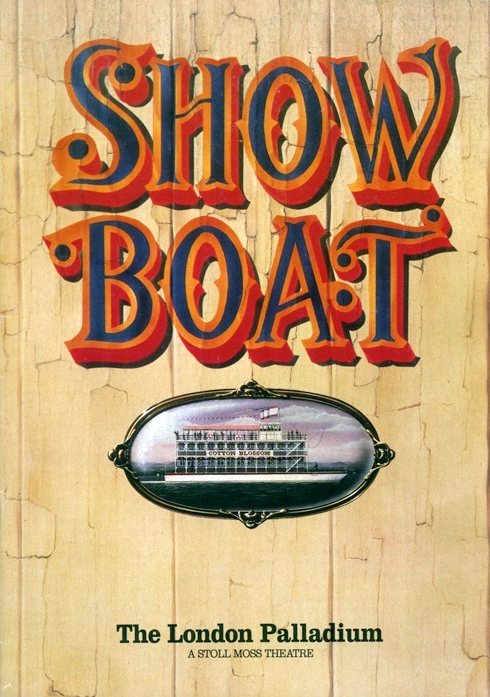
Version 21
Show Boat (1991-03-Palladium Theatre-London)
Type de série: Return EngagementThéâtre: Palladium Theatre (Londres - Angleterre)
Durée : 2 mois
Nombre : 77 représentations
Première Preview : Inconnu
Première : mercredi 13 mars 1991
Dernière : samedi 18 mai 1991
Mise en scène : Ian Judge •
Chorégraphie : Lindsay Dolan •
Producteur :
Avec : Sally Burgess/Marilyn Cutts (Julie), Peter Savidge/Richard Halton (Ravenal), Janis Kelly/ Jan Hartley Morris (Magnolia), Bruce Hubbard (Joe), Geoffrey Hutchings, Margaret Courtenay, Philip Gould, Karla Bums, Anna Daventry
Commentaires : This was a return visit of the same production which had played the Palladium for 9 weeks in 1990. In the interim - and following - it would be on a UK tour.
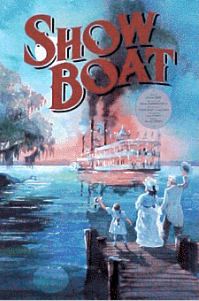
Version 22
Show Boat (1994-10-George Gershwin Theatre-Broadway)
Type de série: RevivalThéâtre: Gershwin Theatre (Broadway - Etats-Unis)
Durée : 2 ans 3 mois
Nombre : 12 previews - 946 représentations
Première Preview : jeudi 22 septembre 1994
Première : dimanche 02 octobre 1994
Dernière : dimanche 05 janvier 1997
Mise en scène : Daisy Prince •
Chorégraphie : Susan Stroman •
Producteur :
Avec : Steve ... Doug LaBrecque / Queenie ... Gretha Boston / Pete ... David Bryant / Parthy Ann Hawks ... Elaine Stritch / Windy ... Ralph Williams / Cap'n Andy ... John McMartin / Ellie ... Dorothy Stanley (ii) / Frank ... Joel Blum / Julie ... Lonette McKee / Gaylord Ravenal ... Mark Jacoby / Vallon ... Jack Dabdoub / Magnolia ... Rebecca Luker / Joe ... Michel Bell / Dealer ... Bob Walton / Jeb ... David Earl Hart / Backwoodsman ... Mike O'Carroll / Young Kim ... Larissa Auble / Ethel ... Danielle Greaves / Landlady ... Lorraine Foreman / Mother Superior ... Sheila Smith / Jim ... Mike O'Carroll / Jake ... Bob Walton / Charlie ... Michael Scott / Lottie ... Louise-Marie Mennier / Dottie ... Karen Curlee / Drunk ... David Bryant / Radio Announcer ... Michael Scott / Kim ... Tammy Amerson / Old Lady on Levee ... Sheila Smith
Commentaires longs: A cast recording was made of the production when it was still in Toronto, prior to Broadway.
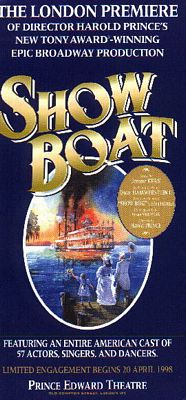
Version 23
Show Boat (1998-04-Prince Edward Theatre-London)
Type de série: RevivalThéâtre: Prince Edward Theatre (Londres - Angleterre)
Durée : 4 mois 3 semaines
Nombre : 175 représentations
Première Preview : lundi 20 avril 1998
Première : mardi 28 avril 1998
Dernière : samedi 19 septembre 1998
Mise en scène : Harold Prince •
Chorégraphie : Susan Stroman •
Producteur :
Avec : Terry Burrell (Julie), Hugh Panaro (Ravenal), Teri Hansen (Magnolia), Michel Bell (Joe), Gretha Boston (Queenie), George Grizzard (Cap ’n Andy), Clare Leach (Ellie)
Commentaires : This production, with a cast of 57 and directed by the legendary Hal Prince, had originated in Toronto, then transferred to Broadway, where it was highly praised and heaped with awards. It was hugely spectacular, superbly staged and performed, and felt by many to be one of the finest productions to grace the London stage in many a year. It ran for 21 weeks on a limited term engagement.
Presse : SHERIDEN MORLEY said, "Musicals don't come a lot better than this".
THE TIMES said, "It's a well-oiled, bustling production".
THE DAILY TELEGRATH says, "Sheer entertainment and real emotional depth"
NICHOLAS DE JONGH of THE EVENING STANDARD says the production is "All heat, urgency and momentum".
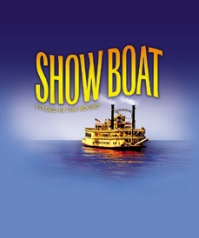
Version 24
Show Boat (2006-06-Royal Albert Hall-London)
Type de série: RevivalThéâtre: Royal Albert Hall (Londres - Angleterre)
Durée : 1 semaine
Nombre : 18 représentations
Première Preview : samedi 10 juin 2006
Première : mardi 13 juin 2006
Dernière : dimanche 25 juin 2006
Mise en scène : Francesca Zambello •
Chorégraphie : Arthur Pita •
Producteur :
Avec : Magnolia ... Elena Shaddow
Queenie ... Angela Simpson
Julie ... Rebecca Thornhill
Parthy Ann Hawkes ... Jenny Galloway
Captain Andy ... David Burt
Gaylord Ravenal ... John Owen-Jones
Joe ... Mark Coles
Ellie ... Emma Dodd
Frank ... Steve Elias
Sheriff Vallon/Radio Man ... Steve Deveraux
Jake ... Seann Alderking
Landlady ... Sarah Ingram
Mother Superior ... Susie Fenwick
Windy ... Hugh Futcher
Steve ... Jarrod Carland
Pete/Backwoodsman ... Gareth Snook
Commentaires : With the Royal Philharmonic Orchestra and a cast of 71 (excluding children!) this was a massive spectacle, and the first time a fullscale musical had been presented at the Royal Albert Hall (although some operas had been performed in the past.) It was highly successful.
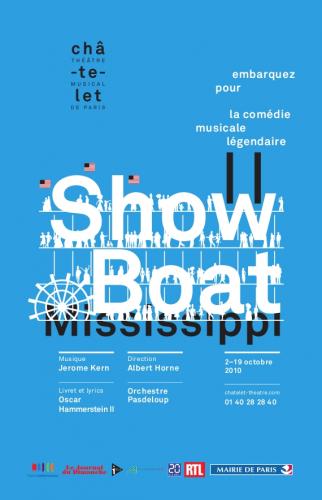
Version 25
Show Boat (2010-10-Théâtre du Châtelet-Paris)
Type de série: RevivalThéâtre: Théâtre du Châtelet (Paris - France)
Durée : 2 semaines
Nombre : 15 représentations
Première Preview : Inconnu
Première : samedi 02 octobre 2010
Dernière : mardi 19 octobre 2010
Mise en scène : Janice Honeyman •
Chorégraphie : Timothy le Roux •
Producteur :
Avec : Steve Baker ... David Chevers / Pete ... Glenn Swart / Queenie ... Miranda Tini / Windy ... James Lithgow / Captain Andy Hawks ... Malcolm Terrey / Parthy Ann Hawks ... Diane Wilson / Child ... Nosiseko Mbundu / Julie ... Angela Kerrison / Ellie ... Dominique Paccaut / Frank Schultz ... Byron-Lee Olivato / Gaylord Ravenal ... Blake Fischer / Joe ... Otto Maidi / Sherriff Vallon/Max ... Graham Clarke / Magnolia Hawks ... Janelle Visagie / Rubber Face ... Marvin Kernelle / Backwoodsman ... Alexander Tops / Jeb ... Christopher Dudgeon / La Belle Fatima ... Bukelwa Velem / Miss France ... Surika Green / Miss USA/Landlady ... Carynn Wolff / Hoochie-Coochie Girls ... Nosiseko Mbundu, Thembela Foloti / Jake ... Anthony Downing / Charlie Cowell ... Tshepo Mohomane / First Barker ... David Chevers / Second Barker ... Revano Singh / Third Barker ... Christopher Dudgeon / Kim ... Marie Midcalf
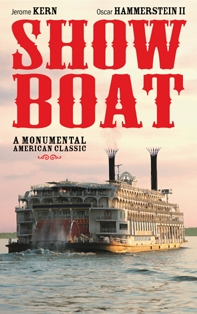
Version 26
Show Boat (2011-07-Goodspeed Opera House-East Haddam)
Type de série: RevivalThéâtre: Goodspeed Opera House (East Haddam - Etats-Unis)
Durée : 1 mois 3 semaines
Nombre :
Première Preview : vendredi 01 juillet 2011
Première : mercredi 27 juillet 2011
Dernière : samedi 17 septembre 2011
Mise en scène : Rob Rob Ruggiero Ruggiero •
Chorégraphie : Noah Racey •
Producteur :
Avec : Magnolia ... Sarah Uriarte Berry
Joe ... David Aron Damane
Gaylord Ravenal ... Ben Davis
Julie ... Lesli Margherita
Parthy Ann Hawkes ... Karen Murphy
Capt. Andy ... Lenny Wolpe
Queenie ... Andrea Frierson
Frank ... Danny Gardner
Ellie ... Jennifer Knox
Kim ... Maddie Berry
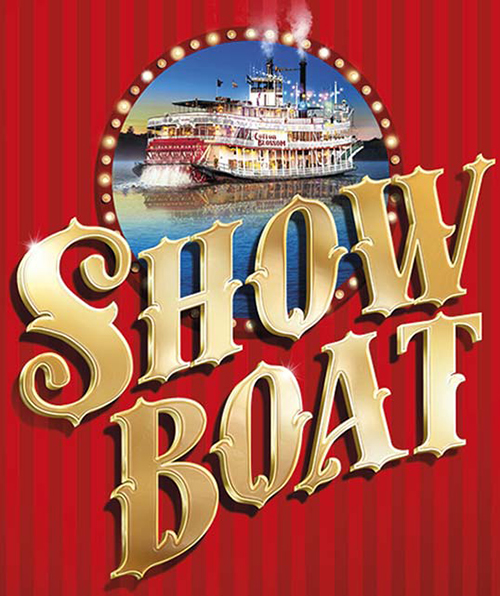
Version 27
Show Boat (2016-04-New London Theatre-London)
Type de série: West End TransferThéâtre: Gillian Lynne Theatre (Londres - Angleterre)
Durée : 4 mois
Nombre :
Première Preview : samedi 09 avril 2016
Première : lundi 25 avril 2016
Dernière : samedi 27 août 2016
Mise en scène : Daniel Evans •
Chorégraphie : Alistair David •
Producteur :
Avec : Malcolm Sinclair (Capt. Andy Hawks), Chris Peluso (Gaylord Ravenal), Gina Beck (Magnolia Hawks), Lucy Briers (Parthy Ann Hawks), Rebecca Trehearn (Julia La Verne), Emmanuel Kojo (Joe), Sandra Marvin (Queenie), Alex Young (Ellie May Chipley), Danny Collins (Frank Schultz), John Coates, Adam Dutton, Kit Esuruoso, Nolan Frederick, Linford Johnson, Javar La’Trail Parker, Kate Milner-Evans, Maria Omakinwa, Ryan Pidgen, Mykal Rand, Leo Roberts, Tosh Wanogho-Maud, Christina Bennington, Victoria Hinde, Linda John-Pierre and Simbi Akande, Georgie Ashford, Laura Darton, Joshua Da Costa, Dale Evans and Tom Partridge
Commentaires : Spanning 40 pivotal years in American history, this epic musical follows the lives and loves of three generations aboard a show boat as it plies the Mississippi River. One of the most romantic musicals of all time, this lavish new production is directed by Daniel Evans and features classics of musical theatre including Make Believe, Can’t Help Lovin’ Dat Man, and the landmark Ol’ Man River.
Extrait - "Bill"
Show Boat (2016-04-New London Theatre-London)
Rebecca Trehearn (Julie La Verne) chante en studio "Bill"
Qualité: ***** Intérêt: ****
Langue: Anglais Durée: 0:03:30
Trailer
Show Boat (2016-04-New London Theatre-London)
Qualité: ***** Intérêt: ****
Langue: Anglais Durée: 0:01:01

.png)
.png)





 Original 1927
Original 1927